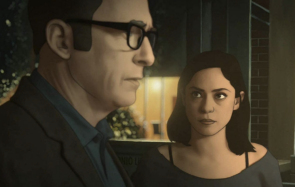Only a couple of miles from my daughter’s elementary school, two planes flew into the World Trade Center. Around the city and across the nation, parents were forced to make quick decisions about how to keep sons and daughters safe from the shadow of a chilling new reality. Psychologists and school counselors advised us to keep the televisions off while our children were home and withhold conversing about 9/11 while they were within earshot.
One week later, on Rosh Hashanah, I led families to the East River for the ceremony of tashlich, when we symbolically purge ourselves of sins by throwing crumbs into running waters. I asked people to suggest communal misdeeds. A kindergartener hurled a piece of bread into the waves and called out in a serious but matter-of-fact tone, “No flying planes into buildings!” This young boy gave voice to what everyone was thinking and no one dared say, exemplifying a child’s wisdom and innocence.
We cannot hide children from the harsh realities of life. They live with dangers beyond our control, but with consistency, concern and nourishing love we can help them feel safe and secure, even in an unpredictable world. I suggest this as an underlying principle to guide us in helping our children face some of life’s darkest truths, including the Holocaust. Here are some other suggestions about how to manage this issue:
Have faith in children’s resiliency
Most educators agree that the Holocaust should not be formally taught until middle school. However, many children are introduced to it at young ages through societal reference, like a mention of Hitler, or personal circumstance, such as tattooed numbers on an elderly neighbor’s arm. This exposure is not dangerous or damaging. Shrouding difficult topics in secrecy may engender fear, while gently addressing them often helps maintain a sense of perspective. Little ones quickly learn to recognize good and evil. However, they focus most on their immediate and personal reality.
Start slowly
As with most challenging subjects, it is best to respond to children’s inquiries with brevity. Follow your children’s lead. They will direct you as to how much information they are prepared to receive.
Respond and reassure
Children’s linguistic limitations may prevent them from clearly articulating their thoughts. For example, if they ask, “Why did the Holocaust happen?” they probably are not curious about history, but could be wondering “Can the Holocaust happen here?” A short, honest and comforting answer could be, “The Holocaust happened a long time ago where people were allowed to be mean to other people. That was different from where we live, because we have rules and people, like police officers and judges, who protect us and keep us safe.”

Teach tolerance
Holocaust education is not academic; it has practical implications. Part of teaching about the Holocaust is raising children to respect other people and to expect that other people respect them. Little ones soak up what we say and do; commenting on people who we consider different conveys a dangerous message, while acceptance models behavior that helps foster understanding.
Create an environment of remembrance
As our children learn about the Holocaust, we can help cultivate in them a sense of empowerment and responsibility through acts such as lighting a yartzeit (memorial) candle on Yom HaShoah (Holocaust Remembrance Day), deciding as a family to donate to a charity for aging survivors or sharing stories about “righteous gentiles” who helped protect Jews from danger.
Employ age-appropriate aids
There are a plethora of books and films that address the Holocaust for children. The Sound of Music portrays a heroic response to the threat of Nazism in a way that is very appropriate for young children. Nine Spoons is a Hanukkah picture book that tells of faith and fortitude.
Make an effort to engage with survivors
Our children are members of the last generation that will have the privilege of knowing Holocaust survivors. Keep this in mind as your child grows old enough to participate in the sacred act of hearing living voices which will soon exist as echoes in history.
Follow your parental instincts
Each child is unique in temperament, sensitivity, and maturity. No one knows your child better than you do. Do not hesitate to reach out to others for advice, but remember that you are the ultimate guide regarding how and when you choose to share difficult information.
Our children did not inherit a world free from danger or fear. But we can use the lessons of the past to help them create a world that is safer, kinder, and more loving. Jewish tradition considers this to be every person’s obligation and urges us to fulfill this mitzvah (sacred task). Our sages remind us that when we teach our children we teach more than just those children–we teach our children, our children’s children and so on until the last generation. By tenderly educating our daughters and sons, we help ensure the well-being of all our descendents.







